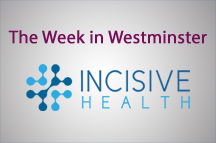.gif) There were moments during this week’s PMQs when it felt like we were back in the pre-Corbyn era. All seven questions focused on the NHS and well-established themes and familiar attack lines dominated the exchanges. The Health and Social Care Act. The NHS in Wales. The funding crisis. Jeremy Corbyn and Theresa May could have been Ed Miliband and David Cameron. 2014 all over again.
There were moments during this week’s PMQs when it felt like we were back in the pre-Corbyn era. All seven questions focused on the NHS and well-established themes and familiar attack lines dominated the exchanges. The Health and Social Care Act. The NHS in Wales. The funding crisis. Jeremy Corbyn and Theresa May could have been Ed Miliband and David Cameron. 2014 all over again.
Given this, it was perhaps unsurprising that neither side was able to land a knockout blow. However, there are signs that the ground may be shifting beneath their feet. On Tuesday, the Chief Executive of NHS England, Simon Stevens, appeared before the Health Select Committee to give evidence on NHS finances. Stevens proceeded to set about subtly challenging the Government’s “we are providing the NHS with the funding it asked for” mantra. First, he rejected the claim, subsequently repeated by Mrs May at PMQs, that the Government was providing £10 billion of additional funding up to 2020/21. Then he went on to state that the NHS had actually only received the funding it had requested in two of the five years and that 2018/19 would actually see a “negative-per person funding growth”.
That Stevens was appearing alongside Jeremy Hunt made for a slightly awkward double act as they put forward different interpretations of the funding situation. Privately, Hunt may appreciate Stevens going out to bat for additional resources ahead of the Autumn Statement.
 For Stevens, however, it is clear that his relationship with the new incumbents of Downing Street will be somewhat different than what went before. His appearance was the latest manoeuver in an increasingly public spat on funding between Number 10 and NHS England. Over the weekend, details of a private meeting between the PM and Stevens, at which he was told in no uncertain terms that there would be no extra money, were leaked to the Guardian.
For Stevens, however, it is clear that his relationship with the new incumbents of Downing Street will be somewhat different than what went before. His appearance was the latest manoeuver in an increasingly public spat on funding between Number 10 and NHS England. Over the weekend, details of a private meeting between the PM and Stevens, at which he was told in no uncertain terms that there would be no extra money, were leaked to the Guardian.
The origins of the power struggle can be traced back to the aforementioned Health and Social Care Act. While much of the Act has been quietly bypassed, the executive independence granted to the NHS leadership has transformed the relationship between the health service and the Government. Stevens used this to his advantage in negotiating deals behind closed doors with the previous regime, but with his allies gone he has decided to take this process public. Whether this is a bold move, a brave move or a move of last resort is a matter of judgement.
It is therefore slightly surprising that Corbyn did not press the Prime Minister on Stevens’ comments at PMQs, as it would seem there is political hay to be made here. However, there are some signs that Labour’s new shadow health team will take up the challenge with gusto. Shortly after PMQs, a press release highlighting the division was issued. The new Shadow Health Secretary, Jon Ashworth, earned his stripes as an adviser to Gordon Brown; we can expect him to have a keen interest in where the money goes.
Of course, there were also significant developments away from health this week. The Select Committee Chair elections saw two of Labour’s big beasts rise from their self-imposed front line political hibernation, with Yvette Cooper and Hilary Benn assuming positions that will provide them with high profile platforms to scrutinise the Brexit process.
As the nights lengthen, politics seems somewhat more normal. The Opposition on health is busier and more functional. Whether this translates into political cut-through, or forces increased investment in the NHS, remains to be seen.












